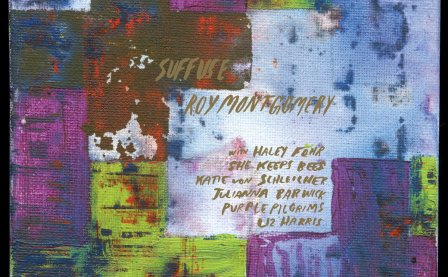
Haley Fohr, who usually gets around under her experimental folk moniker Circuit des Yeux, has announced a run of supremely special shows in which she will be performing a live score to the silent film Salomé in the UK and USA.
The multi-octave caterwauls of Fohr will be bringing a modern context to one of the first art-films ever made in America (way back in 1923) which in turn is an adoption from Oscar Wilde’s tres controversial one-act play of the same name. Wilde himself borrowed the story from a little-known self-help book called The Bible, and the first scheduled performance of the play was banned because, at the time (1892), it was illegal to depict characters from The Bible.
Obviously times have changed since 1892 and 1923 — and Fohr’s live score is set to bring a modern context to the depiction of the feminine in the work. But, instead of mansplaining that one, here’s what Fohr has to say:
Salome, the 1923 silent film starring Alla Nazimova, was adapted from a play by Oscar Wilde. Wilde’s play was originally banned from performance & considered an all-too-risque representation of the biblical story that inspired it. I initially found the film’s statement to be wildly outmoded & filled with stereotypes. Salome is a person turned object, stripped of her name (referred to Biblically as “Herod’s step-daughter”), and labeled as a dangerous female seductress through the means of Christian mythology. “Femme fatale” is a cheap and outdated trope used in entertainment, initially misidentified as a small step in female empowerment. But that was the 1900’s! This is a scene from the past, staged in the future! The modern and avant garde set design (beautifully designed by Nazimova herself) are a powerful synthesis of contextual absurdity. It lends a natural compulsion to find the usefulness of this piece within our own contemporary world. In this now-age of misogyny dismemberment I ask that we utilize this historic film and re-contextualize it into a new kind of satire - one that represents the modern female (other) psyche as it navigates the treacherous maze from innocence (purity) to womanhood (knowledge).
This is a story about a woman who is yearning to be heard, but is denied the road of truth. When I see Salome’s need for John The Baptist I see a woman’s need to be heard, not desired. When I see Salome dancing the seven veils — an action forced onto every woman at some point in her life — I see a woman utilizing the only tool at her means, the male gaze. When I see Salome order the head of John The Baptist, I see a woman committing her own societal suicide through a powerful act of anarchy in which she is denying the presented world. It is one in which she is not heard and cannot belong.
The end of this film leaves me with a deep sadness. The death and destruction found in this film I see mirrored in the world today. It is a product of our own design. Let us mute these one-sided conversations, this feedback loop, that leaves all others powerless, and without resources. The time is now to hear the stories of others, even if they may be in languages we yet not speak. For where there is no truth, there cannot be love, and without love, there is no peace. For Peace, Salome.
I composed this score to a version of the film without inter-titles and as such believe it must be screened in this way. Perhaps it is a bold request, but by muting the conversation at hand I find new a story quickly sprouting in its place, and the score was composed as much to that story as to the film itself.
There you have it. Any questions?
Good. Here’s a list of Salomé’s live-scored screenings:
05.12.18 - Leeds, UK - Howard Assembly Room
05.16.18 - London, UK - Barbican (Cinema 1)
08.24.18 - Chicago, IL - Art Institute of Chicago
More about: Circuit des Yeux, Haley Fohr


